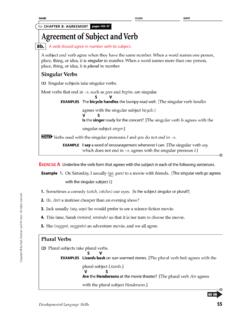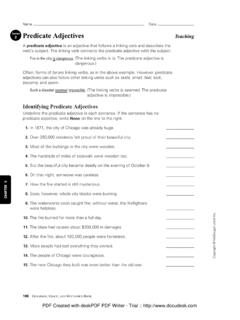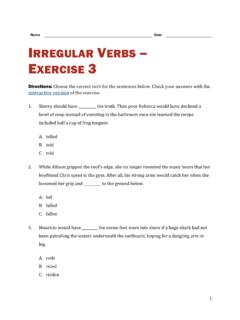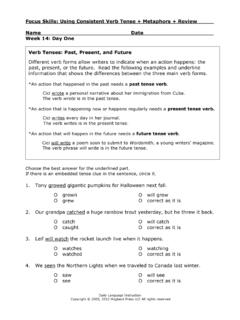Transcription of for CHAPTER 9: USING VERBS CORRECTLY Regular and …
1 Developmental Language Skills65 Copyright by Holt, Rinehart and Winston. All rights 9: USING VERBS CORRECTLY pages 186= and Irregular VerbsRegular VerbsA Regular verbforms its past and past participle by adding dor edto the base FORMPRESENT PARTICIPLEPAST FORMPAST PARTICIPLEOF verb ( INGFORM)( EDFORM)( EDFORM)inspect[is] inspectinginspected[have] inspectedshop[is] shoppingshopped[have] shoppeddisagree[is] disagreeingdisagreed[have] disagreedWhen people speak quickly, they sometimes sound as though they are dropping the dor edending, especially in words like used, supposed,and matter how thesewords sound to you, they are spelled with was suppose to be here.[The edis missing from the past form.]STANDARDTim was supposedto be in the blank in each sentence with the correct form of the Regular verb . The verb you willuse is given in parentheses after each at the grocery store yesterday.
2 (shop)[ The past tense of shopis shopped.] vegetable bins fresh spinach, mushrooms, and ginger root. (offer)[ What is thepast form of the verb in parentheses?] I to buy ginger root? (suppose) have scallops, but I have never eaten mussels. (taste) I was through the store, I saw the display of spices. (walk) could have all the types of spice, but I did not have time. (count)Irregular VerbsAn irregular verbforms its past and past participle in some other way than by adding dor edto the base VERBS form their past and past participle in several ways. The verb s vowel maychange, or the verb s consonants may FORMPRESENT PARTICIPLEPAST FORMPAST PARTICIPLE sing[is] singingsang[have] sungbind[is] bindingbound[have] boundspend[is] spendingspent[have] spentWhen you are not sure whether a verb is Regular or irregular, do not guess. Look the verbup in a good dictionary.
3 The dictionary will list all irregular forms of a CourseCopyright by Holt, Rinehart and Winston. All rights the correct form of the irregular verb in each sentence. Hint: You may want to reviewthe list of irregular VERBS in your textbook before doing this (ran, run)her first marathon last weekend. [ The vowel uin runchanges to ain thepast form ran.] ! Your baby brother (built, builded)a tower of four blocks. [Does the vowel or consonantchange in the past form?] , our soccer team (lost, losed)the second (becomed, became)sleepy during the late the trees (began, begun)to lose their leaves? uncle (sent, sended)me a photograph of his new form the past and the past participle, an irregular verb s vowels andconsonants maychange, or the verb may make no changes at FORMPRESENT PARTICIPLEPAST FORMPAST PARTICIPLEbuy[is] buyingbought[have] boughtbring[is] bringingbrought[have] broughtburst[is] burstingburst[have] burstEXERCISECC ircle the correct form of the irregular verb in each sentence.
4 Hint: You may want to reviewthe list of irregular VERBS in your textbook before doing this (feeled, felt)much better after he rested. [Both the vowel and the final consonantof feelchange to form the past felt.] cat (put, putted)its toy mouse on my pillow! [Does the past form change?] have you (sold, selled)at the garage sale so far? many pecans have (falled, fallen)from the tree? (speaked, spoke)at the last meeting of the school two shirts (cost, costed)less at the other 9: USING VERBS CORRECTLY continuedpages 186=92 Developmental Language Skills67 Copyright by Holt, Rinehart and Winston. All rights 9: USING VERBS CORRECTLY pages 196= n s eThe Six TensesThe tenseof a verb indicates the time of the action or state of being expressed by the time of an action or state of being can be past, present,or verb has six six tenses indicate different ways of expressing are three mole digsa burrow.
5 [The present tense verb digsindicates an actionthat happens regularly.]PRESENT PERFECTThe mole has duga burrow.[The present perfect tense verb has dugindicates an action that started to happen sometime in the past. Theaction may continue into the present.]PASTThe mole duga burrow.[The past tense verb dugindicates an action thathappened at a particular time in the past.]EXERCISEAI dentify the tense of each underlined verb in the following sentences. Write present, presentperfect,or paston the line finishedhis report already? [Has finishedis the presentperfect tense of the verb finish.] gatheredwild blackberries last summer. [ Which verb tense indicates anaction that happened last summer?] student council meetstwice a ever eatena perfectly ripe mango? bats flyout of the cave at movie hasalready are three more PERFECTThe mole had duga burrow.[The past perfect tense verb had dugindicatesan action that happened before a specific time in the past.]
6 ]FUTUREThe mole will diga burrow.[The future tense verb will digindicates anaction that will happen in the future.]FUTURE PERFECTThe mole will have duga burrow.[The future perfect tense verb will havedugindicates an action that will have happened before a specific time inthe future.]present perfect68 HOLTHANDBOOKS econd CourseCopyright by Holt, Rinehart and Winston. All rights the tense of each underlined verb in the following sentences. Write past perfect,future,or future perfecton the line bread will tastebetter when we toast it. [Will tasteis thefuture tense of the verb taste.] December, we will have livedin Nebraska for a year. [ Which tense indicates an action that will have happened by a specific time in the future?] hard work and a good attitude, they will had eatenbreakfast before he came to the time she finishes this book, she will have reada thousand drama class hadalready paintedthe Progressive FormEach tense also has an additional form called the progressive progressive formexpresses an action or state of being that keeps going on.
7 In each tense, the progressive form ofa verb consists of the appropriate form of beplus the verb s present present participle is the ingform of the PROGRESSIVETad is cleaningthe PROGRESSIVETad was cleaningthe PROGRESSIVETad will be cleaningthe PERFECT PROGRESSIVETad has been cleaningthe PERFECT PROGRESSIVETad had been cleaningthe PERFECT PROGRESSIVETad will have been cleaningthe the verb form indicated in parentheses on the line father home soon. (future progressive form of arrive) [Thefuture progressive form of arriveis will be arriving.] two-year-old around the playground. (past progressive form of run)[Progressive forms use a form of the verb beand the ingform of the verb .] summer, I my grandparents in Canada. (future tense of visit) part in Olympic games as early as 776 (past tense of take) next month, Nancy enough money for the trip.
8 (future perfect tense of earn) a poster for the play. (present perfect tense of design)will be arrivingREMINDER futureNAMECLASSDATEforCHAPTER 9: USING VERBS CORRECTLY continuedpages 196=98 Developmental Language Skills69 Copyright by Holt, Rinehart and Winston. All rights 9: USING VERBS CORRECTLY pages 201=205 Sit and Set, Riseand Raise, Lieand LaySitand SetThe verb sitmeans to be seated or to rest. Sitseldom takes an object is a word that receives the action of a audience had satpatiently for an hour.[Had satmeans had been is no object.]The verb setusually means to place (something somewhere) or to put (something somewhere). Setusually takes an , please setthe groceries on the counter.[Settakes an object, groceries.]To choose between sitand set,try replacing the verb with a form of the new sentence makes sense, then you will probably use a form of the verb the new sentence does notmake sense, then you will probably use a form of the verb you (sitor set) up the volleyball net by yourself?
9 [Does Can you put up the volleyball net by yourselfmake sense? Yes, so setis the right verb to use.]Can your baby sister (sitor set) up by herself? [Does Can your baby sister putup by herselfmake sense? No, so sitis the right verb to use.]EXERCISEAC ircle the verb that CORRECTLY completes each of the following (Sit, Set)down in the waiting room, please. [Sitmeans be seatedand has no object.] you (sit, set)your books on the shelf? [Does the verb have an object?] cardinal is (sitting, setting)on its week, we (sat, set)at a table in the back of the 7:00 yesterday morning, we were (sitting, setting)up the obstacle students had already (sat, set)up the RaiseThe verb risemeans to move upward or to go up. Risedoes not take an some days, the moon riseswhile the sun is still out.[Risesmeans goes upand does not take an object.]The verb raiseusually means to lift something up.
10 Raiseusually takes an woman is raisingher hand.[Is raisingtakes an object, hand.]TIPREMINDER70 HOLTHANDBOOKS econd CourseCopyright by Holt, Rinehart and Winston. All rights the verb that CORRECTLY completes each Nora (raise, rise)the flag this morning? [ The verb has an object,flag,so raiseis thecorrect verb .] sun had (raised, risen)by the time we left. [Does the verb have an object?] birds will (raise, rise)the (rose, raised)from his chair and walked to the ivy always (raises, rises)an itchy red rash on my by brick, the walls of the new house are (rising, raising)higher each LayThe verb lieusually means to recline, to be in a place, or to remain lying down. Liedoesnot take an liesdown for a quick nap in the afternoon.[Liesmeans reclinesanddoes not have an object.]The verb layusually means to put (something) down or to place (something somewhere).












